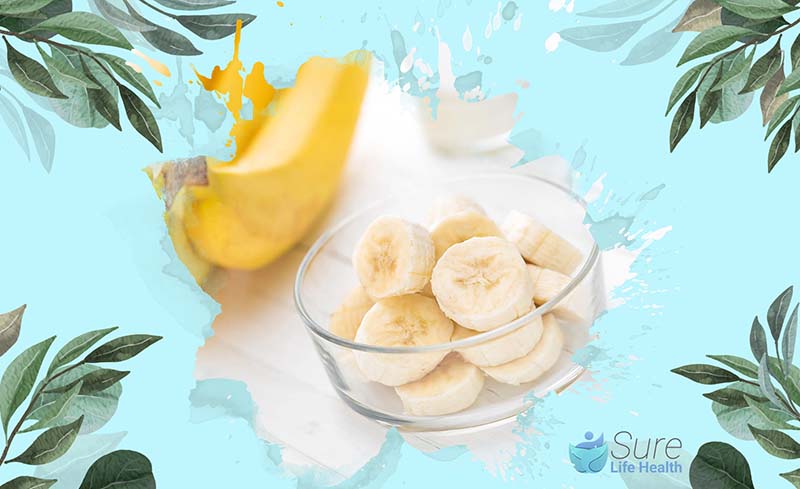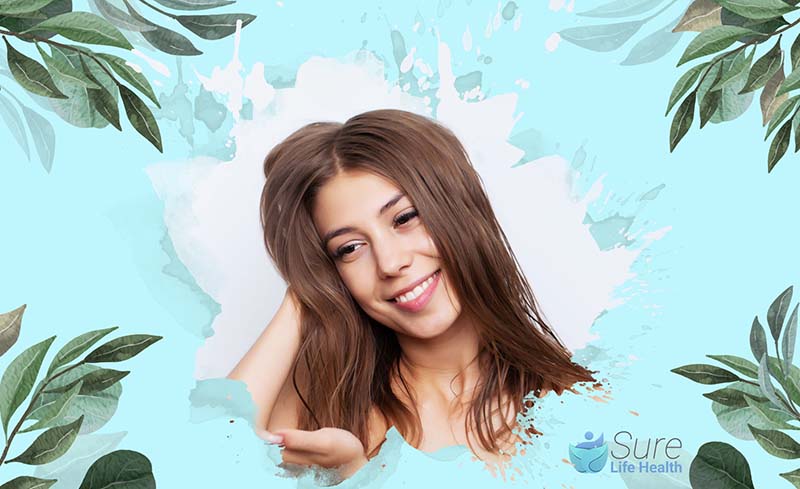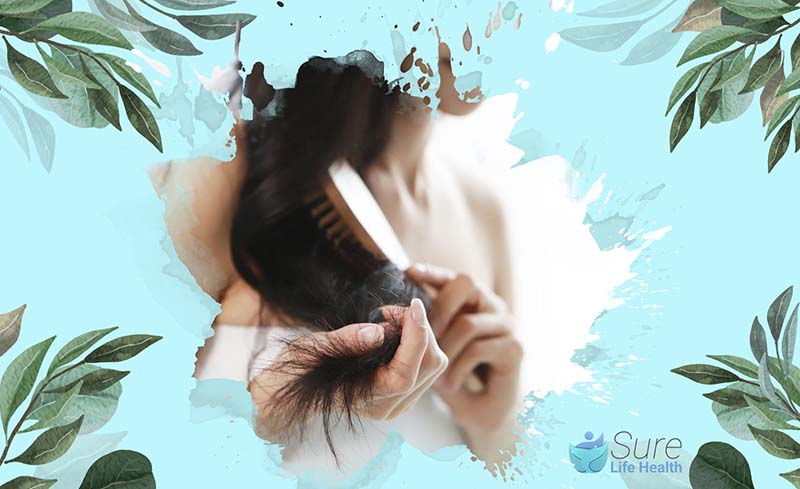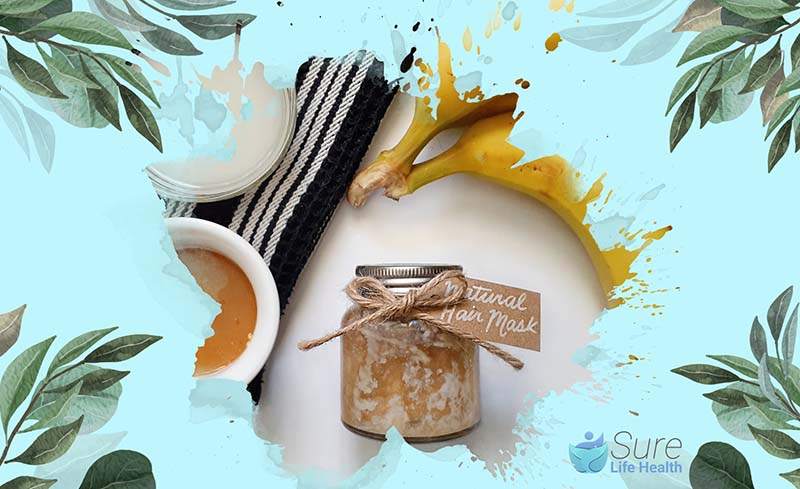Bananas are not just a delicious and nutritious snack; they also offer remarkable benefits for your hair. Packed with essential nutrients like carbohydrates, fiber, vitamins, potassium, magnesium, manganese, and selenium, bananas are truly a powerhouse for overall health.
But did you know they are also excellent for your hair? In this article, we explore the question, “Is banana good for hair?” and investigate all the incredible benefits bananas provide for enhancing hair health and beauty.
Join us as we reveal the many surprises bananas have in store!
Is Banana Good for Hair?
Bananas are really good for hair health. They are full of nutrients, help moisturize your hair, and even make it softer and shinier. Bananas can help with common hair problems like dryness, dull hair, and frizz, and they also promote hair growth.
However, everyone’s hair reacts differently, so while bananas can do a lot for your hair, they might not work the same for everyone. Some people might be sensitive to the sugars in bananas or could be allergic to them. It’s a good idea to test a small amount on your skin before using banana masks on your hair.
Besides using bananas, eating well, drinking plenty of water, and keeping up with a good hair care routine are all important for keeping your hair healthy.

What Nutritional Ingredients Do Bananas Help in Hair Growth?
Bananas, a tropical fruit loaded with essential vitamins, minerals, and unique compounds, offer a comprehensive, natural solution for nourishing and fortifying your hair.
- Potassium: Crucial for hair health, potassium strengthens hair fibers and helps prevent breakage. It also supports a healthy scalp environment, which is essential for hair growth.
- Vitamin C: Known for its powerful antioxidant properties, vitamin C is vital for collagen production, which bolsters hair’s structure and strength. Additionally, it enhances iron absorption, critical for promoting healthy hair.
- Antibacterial and Antioxidant Properties: Bananas boast natural antibacterial and antioxidant compounds that alleviate scalp irritation and combat dandruff. These benefits help maintain a clean and healthy scalp, laying the groundwork for robust hair growth.
Advantages of Bananas to Help Grow Hair
Bananas are not just a delicious tropical fruit; they also offer numerous benefits for hair growth and health when included in your hair care routine.
Promotes Hair Growth
Bananas are rich in potassium, a vital mineral for cell growth, including the cells in hair follicles. Low potassium levels have been linked to hair loss.
Bananas also provide vitamin B6, crucial for protein metabolism—important since hair is primarily composed of the protein keratin. Adequate B6 helps ensure strong hair growth.
Enhances Natural Shine
The natural sugars and amino acids in bananas help smooth the hair cuticle. A flat cuticle reflects more light, giving your hair a glossy, healthy look.

Nourishes Hair
Bananas are loaded with essential vitamins for hair health. Vitamin A boosts sebum production, keeping the scalp naturally moisturized.
Vitamin C, a strong antioxidant, protects the hair from environmental damage and aids in collagen production, strengthening hair. Vitamin E improves scalp circulation, which can further enhance hair growth.
Reduces Dandruff
Dandruff can be aggravated by a dry scalp or a yeast-like fungus called Malassezia. Bananas address both issues.
They moisturize the scalp, reducing flakiness, and their antimicrobial properties can suppress the growth of Malassezia.
Prevents Split Ends
Split ends happen when the hair’s outer layer gets damaged, causing it to fray.
The moisturizing effect of bananas keeps hair hydrated and the cuticle smooth, minimizing the chance of split ends.

Instructions for Using Bananas for Hair Care
Bananas can be a fantastic addition to your hair care routine. Here are some effective hair packs using bananas as the main ingredient:
Banana & Curd Hair Pack
This mask is excellent for anyone unsure about applying curd to hair. Banana and curd both possess antimicrobial and antioxidant properties, making them effective against various types of dandruff and itchy scalp. This mask detoxifies and cleanses the scalp thoroughly.
Ingredients:
- 1 Banana
- 3 Tablespoons Curd
How To Use:
- Mash the banana and mix it with the curd.
- Massage the mixture into your scalp and hair.
- Leave it on for 30-35 minutes before washing your hair.
Banana & Carrot Hair Pack
Rich in essential nutrients, bananas and carrots support healthy hair growth. Bananas are especially good as they contain silica and vitamin B6.
Ingredients:
- 1 Banana
- 3 Tablespoons Carrot Juice
How To Use:
- Mash the banana and mix in the carrot juice.
- Apply the mixture to your scalp and hair.
- Wait for 30-35 minutes before washing off with a gentle cleanser.
Banana & Honey Hair Mask
Honey, a natural humectant with antibacterial properties, works with bananas to condition, moisturize, and add shine to dry and dull hair.
Ingredients:
- 1 Banana
- 2 Tablespoons Organic Honey
How To Use:
- Combine the mashed banana with honey.
- Massage this into your hair and scalp.
- Leave for 20-25 minutes before washing out.
Banana & Egg Hair Pack
This moisturizing pack aims for long, healthy locks, repairing damaged hair with regular use.
Ingredients:
- 1 Banana
- 1 Egg
How To Use:
- Beat the egg and mix thoroughly with the mashed banana.
- Apply to your hair and scalp.
- Leave for 20-25 minutes before rinsing.
Banana & Coconut Oil Hair Mask
Ideal for dry and damaged hair, this mask moisturizes and strengthens hair, promoting growth and improving texture.
Ingredients:
- 1 Banana
- 2 Tablespoons Coconut Oil
How To Use:
- Mix the coconut oil with the mashed banana until smooth.
- Apply evenly to your scalp and hair.
- Leave on for 20-25 minutes, then wash off with shampoo.

Notes When Applying Bananas to Hair
Banana allergies, known as latex-fruit syndrome, are a potential concern. Individuals with this type of allergy should steer clear of using bananas topically, such as in hair mask applications.
It’s also important to be thorough when rinsing out banana hair masks. Ensuring all banana residue is completely washed from your hair is crucial, as any remnants left on the scalp can cause irritation and potentially exacerbate dandruff symptoms.
FAQs
How long should I leave a banana hair mask on my hair?
For optimal results, let the banana hair mask sit on your hair for 20-30 minutes.
This duration allows the nutrients to thoroughly penetrate your hair and scalp, maximizing the benefits of the treatment.
Can I use banana hair masks on colored or chemically treated hair?
Yes, banana hair masks are indeed safe for colored or chemically treated hair.
They provide nourishment and help repair damage resulting from chemical treatments, making them a beneficial choice for maintaining healthy, vibrant hair.
How often should I use a banana hair mask?
For dry or damaged hair, applying a banana hair mask 1-2 times a week is recommended to help restore moisture and repair damage. If you have oily hair, using the mask once every two weeks is sufficient to balance natural oils without over-moisturizing. For those with normal hair, a weekly banana hair mask can maintain hair health and vibrancy.
Will a banana hair mask make my hair greasy?
Not usually, but if you have oily hair, use it less often and consider adding lemon juice or aloe vera to reduce oiliness.
Can I mix bananas with other natural ingredients for better results?
Yes, mixing bananas with ingredients like honey, yogurt, or coconut oil can boost the mask’s effectiveness and provide extra nutrients.
Conclusion
In conclusion, the question “Is banana good for hair?” can be confidently answered with a resounding yes. Bananas are rich in vitamins, minerals, natural oils, amino acids, and antioxidants, making them highly beneficial for hair health. They promote a healthy scalp, strengthen hair follicles, provide moisture, and repair damage, significantly enhancing hair health and vitality.
Whether incorporated into a banana hair pack for growth or applied directly, bananas can nourish and improve your hair’s appearance, leaving it moisturized, shiny, and healthier. Embrace the natural benefits of bananas for your hair and enjoy the remarkable results.
Don’t forget to explore more informative and helpful blogs from Sure Life Health, where we continue to uncover the best in natural health care.
Professor Gaye Cunnane, PhD, MB, FRCPI
As the Director of Health and Wellbeing at RCPI, Professor Gaye Cunnane is at the helm of initiatives aimed at enhancing the health and well-being of RCPI Trainers and Trainees. Her role extends beyond administration; she is also a respected clinical professor of rheumatology and a consultant rheumatologist at Trinity College Dublin (TCD) and St James’s Hospital. Prof. Cunnane’s medical journey began at TCD, where she graduated from medical school, and her path has been marked by both clinical and academic excellence.
After completing her basic clinical training in medicine, she embarked on PhD studies at University College Dublin and St Vincent’s University Hospital. Her research during this period was focused on prognostic markers in early inflammatory arthritis, a project that saw her collaborating with esteemed universities across Europe, including in Switzerland, The Netherlands, the UK, and Sweden.
Prof. Cunnane’s career took her to the University of California, San Francisco, where she spent three years delving into research on new treatments for lupus. Her academic prowess led her to the University of Leeds in 2001 as a senior lecturer, before returning to Ireland in 2003 to assume her current roles. She has also served as the National Specialty Director for Rheumatology training in Ireland, Programme Director for Basic Specialist Training with RCPI, and as a past President of the Irish Society for Rheumatology.
PUBLISHED ARTICLES
“Rheumatic disease differentiation using immunoglobulin G sugar printing by high-density electrophoresis”: Published in The Journal of Rheumatology, this study reflects her in-depth investigation into rheumatic diseases.
“Benefits of exercise in patients with rheumatoid arthritis: a randomized controlled trial”: This research work, highlighting the positive impact of exercise on rheumatoid arthritis, underscores Prof. Cunnane’s dedication to practical, patient-centered research.
Additionally, Prof. Cunnane has made notable contributions to the Annals of the Rheumatic Diseases, discussing early referral, diagnosis, and treatment of rheumatoid arthritis. She has also been involved in a study on the NCBI platform investigating exercise benefits in rheumatoid arthritis patients.
Professor Gaye Cunnane’s career is a testament to her commitment to improving patient outcomes in rheumatology through rigorous research, clinical excellence, and dedicated teaching. Her work continues to influence the field of rheumatology, both in Ireland and internationally.

